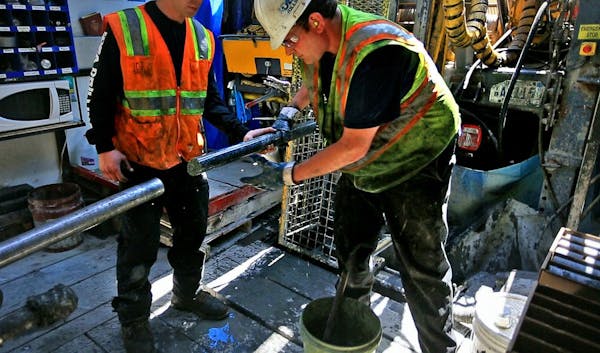Minnesota regulators could lose a key tool for protecting the Boundary Waters Canoe Area Wilderness from a large copper-nickel mine under a federal proposal now at the White House.
The changes to the Clean Water Act, ordered by President Donald Trump, are aimed at preventing delays on big federal projects — such as pipelines, dams and mines — by limiting the ability of states and tribes to study their effect on water quality in what's called a Section 401 certification.
The EPA said the changes are intended "to increase predictability and timeliness" of Section 401 reviews.
"The EPA's existing certification rules have not been updated in nearly 50 years and are inconsistent with the text of CWA Section 401, leading to confusion and unnecessary delays for federally licensed or permitted projects," the agency said in statement to the Star Tribune.
The agency did not answer questions about concerns that the changes would undermine Boundary Waters protections.
When they were proposed last year, the changes were condemned by environmental groups, tribes and nearly two dozen state attorneys general, including Minnesota Attorney General Keith Ellison, as a violation of a bedrock environmental law. They are awaiting the publishing of the final rule in the Federal Register to see how the language may have changed.
The water quality certification rule is at the Office of Management and Budget undergoing final review. It's expected to go back to the EPA soon for signing and then publishing.
If the changes are similar to last year's proposal by the EPA, they will strip states and tribes of much of their authority to ensure projects comply with local rules for protecting lakes, streams and wetlands.
The changes come at a critical time for Minnesota with one of the most controversial mine projects in the state's history entering the regulatory review process.
The huge copper-nickel mine that Chilean copper mining giant Antofagasta and its Twin Metals subsidiary want to build just outside the Boundary Waters will produce 20,000 tons of ore per day.
The project could require a 401 water quality certification if it's determined that the mine could damage water quality in the Boundary Waters, where even motorized fishing boats aren't allowed.
The Boundary Waters area enjoys special protections in Minnesota, which deems it an "outstanding resource value water."
Katrina Kessler, assistant commissioner of the Minnesota Pollution Control Agency (MPCA), called the proposed Section 401 changes "a big concern for Minnesota."
Kessler sent the EPA a comment letter last October after the agency first proposed the changes, saying the proposed rule "would leave us unable to address the potential water quality concerns in or near the Boundary Waters Canoe Area Wilderness."
In an interview, Kessler said that Minnesota's stricter standards would be overruled and the state "would only be directed to protect to a very low bar."
The agency issues roughly a dozen 401 certifications a year for a range of projects.
The proposed changes set a one-year time limit for local reviews while allowing federal agencies to demand even faster turnaround. They also allow federal agencies to veto what states and tribes decide. Finally, they squeeze down the scope of reviews to a specific point source discharge from a project, such as waste water draining from a pipe into navigable waters, as opposed to considering broader impacts on an ecosystem.
The focus on point source discharge is a "big area of concern for us," Kessler said, because it excludes a project's air emissions, such as mercury.
Becky Rom, national chairwoman of the Campaign to Save the Boundary Waters, said she thinks the restrictions would also exclude potential leakage from the huge mound of dry mine tailings waste that Twin Metals will build on its site, as well as fugitive dust and heavy metals such as mercury blowing off the waste mound and pumped out in the exhaust vented from the underground mine. The tiny particles float in the air and get deposited back onto the land, lakes, streams and wetlands.
"Industry gets a free card on this," Rom said.
Some business groups support the abbreviated reviews. Tony Kwilas, director of environmental policy for the Minnesota Chamber of Commerce, said he doesn't think the changes threaten the Boundary Waters.
"They are still going to have input into the process, whether it's the Boundary Waters or southern Minnesota, or a bridge that's being built or a dam," Kwilas said. "There's still going to be a public notice period and public comment period."
The changes are the result of two executive orders Trump signed last year to speed construction of oil and gas pipelines, one of which directed the EPA to tighten Section 401 of the Clean Water Act and set a May deadline.
The rule change could take effect later this summer, but potential legal challenges might delay it.
"If it's anything like the proposed rule that came out last summer, I would be very surprised if some organizations and some states don't challenge it," said Jon Devine, senior attorney and director of federal water policy at the Natural Resources Defense Council.

Dog returned safely to woman who had 'Tiny' stolen from her while on a walk in St. Paul 2 days ago

Prairie Island Indian Community requests the return of 'Mankato Hanging Rope'

